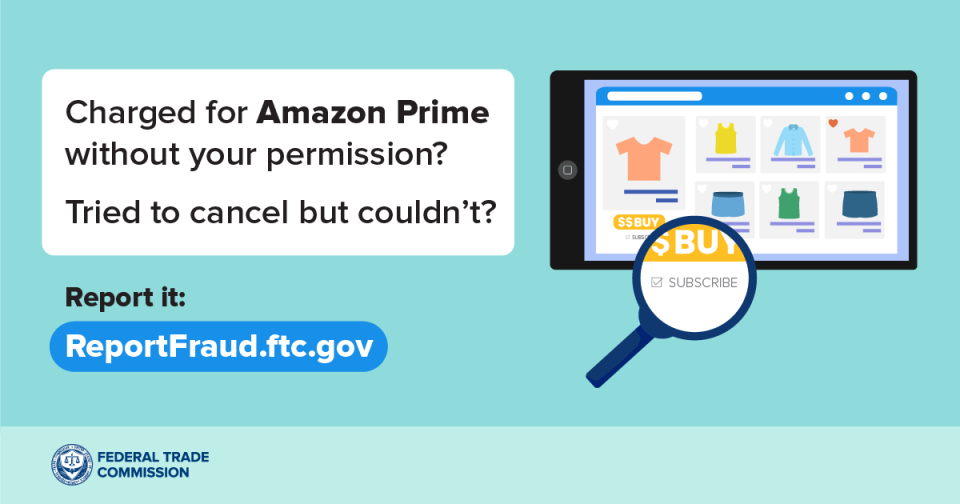Online shopping can be convenient and easy. But with sometimes lots of screens before you get to check-out, you could wind up signed up for a service without even knowing it. What’s worse, it can be tough to cancel. Read on to learn how to protect yourself from unwanted services and charges.
Today, the FTC filed a lawsuit against Amazon, saying the company violated the law by enrolling people in its Amazon Prime subscription service without their permission, continuing to charge them, and making it hard to cancel.
The FTC says the company used a series of hurdles — known as “dark patterns” — to make it hard for customers to understand that they were starting a Prime subscription. These dark patterns also made it hard for people to cancel their Prime subscriptions by making them hunt for the right place to cancel online, and then click through complicated extra pages to cancel. Often, consumers would call Amazon’s customer service, only to be referred back to the website to cancel, making the process even more frustrating.
To help avoid unwanted services and charges when you shop online:
- Watch what goes into your shopping cart. Even if you empty your cart and leave the site without completing your purchase, you still could have been enrolled in a subscription service.
- Watch for pre-checked boxes. They may sign you up for a product or service.
- Carefully review your order before completing a transaction. If something got added that you don’t want, make sure to remove it.
- Make sure you didn’t get charged for something you don’t want. Check your order confirmation to see. If you did, contact the company to cancel and get a refund. Make sure you get — and keep — the written confirmation.
- Watch your bank or credit card statements. If you’re in a subscription, you’ve tried to cancel, and the company won’t stop charging your account, dispute it with your credit or debit card issuer.
- Look for auto-renewals. Unless you cancel, you’ll continue to be charged.
If a company signed you up for a subscription service without your permission, or if you have problems with canceling a subscription service, tell the FTC at ReportFraud.ftc.gov.


I am dealing with this today. My account shows I am not signed up for prime but there is a charge for it on my bank account. I contacted the bank. They locked my account.
Even though I have a year membership Amazon has two different times now signed me up for monthly membership without my consent. I saw the recurring monthly charges of $14.99 on the same debit card I used to pay for my monthly membership. Then over Xmas-Amazon charged a card I had in my digital wallet-even though I never use that card on Amazon-someone either a person or not is charging me without consent-and for sure I am not checking any boxes for membership-I’m already a yearly member. This is scam and theft. When I call to complain, I do get my money back but then Amazon just tells me to get a new “debit card so it doesn’t happen again” NO! Amazon needs to take responsibility for these unauthorized membership enrollments and charges.
Amazon has been charging me TWICE a month for prime membership! I have cancelled it several times but it just keeps doing it on my store card and my bank card!!
I have been signed up for Amazon Prime three times since mid October 2023 without my permission. I only found out about each fraud when I got an email from Amazon congratulating me on my new Prime membership. The first month's charge is automatically posted to my credit card and then I have to go though a lot of hoops to cancel the membership and have the monthly charge removed. The credit card company suggested that I change my Amazon credit card account number which I did. If the problem persists, I will cancel my Amazon credit card and stop buying anything from the company. I am hoping that a class action law firm files a law suit against Amazon and that the company is ordered by a court to pay damages to its victims.
Pagination